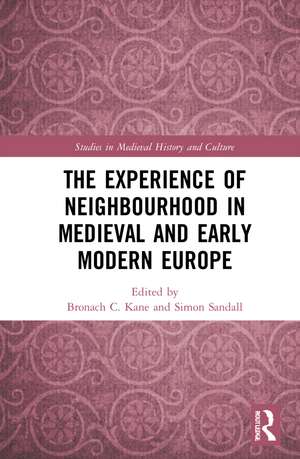The Experience of Neighbourhood in Medieval and Early Modern Europe: Studies in Medieval History and Culture
Editat de Bronach C. Kane, Simon Sandallen Limba Engleză Paperback – 31 mai 2023
Din seria Studies in Medieval History and Culture
-
 Preț: 302.09 lei
Preț: 302.09 lei -
 Preț: 310.41 lei
Preț: 310.41 lei - 9%
 Preț: 1039.98 lei
Preț: 1039.98 lei - 9%
 Preț: 1013.20 lei
Preț: 1013.20 lei -
 Preț: 311.14 lei
Preț: 311.14 lei -
 Preț: 310.89 lei
Preț: 310.89 lei -
 Preț: 309.23 lei
Preț: 309.23 lei -
 Preț: 310.95 lei
Preț: 310.95 lei -
 Preț: 665.95 lei
Preț: 665.95 lei -
 Preț: 481.58 lei
Preț: 481.58 lei -
 Preț: 434.84 lei
Preț: 434.84 lei - 18%
 Preț: 998.71 lei
Preț: 998.71 lei - 18%
 Preț: 998.71 lei
Preț: 998.71 lei -
 Preț: 449.41 lei
Preț: 449.41 lei -
 Preț: 435.59 lei
Preț: 435.59 lei -
 Preț: 444.62 lei
Preț: 444.62 lei -
 Preț: 320.36 lei
Preț: 320.36 lei -
 Preț: 486.80 lei
Preț: 486.80 lei - 31%
 Preț: 767.47 lei
Preț: 767.47 lei - 18%
 Preț: 1109.18 lei
Preț: 1109.18 lei - 18%
 Preț: 1109.99 lei
Preț: 1109.99 lei - 18%
 Preț: 1002.80 lei
Preț: 1002.80 lei -
 Preț: 478.71 lei
Preț: 478.71 lei - 18%
 Preț: 997.27 lei
Preț: 997.27 lei - 18%
 Preț: 835.96 lei
Preț: 835.96 lei -
 Preț: 433.86 lei
Preț: 433.86 lei -
 Preț: 499.74 lei
Preț: 499.74 lei -
 Preț: 479.47 lei
Preț: 479.47 lei - 31%
 Preț: 766.31 lei
Preț: 766.31 lei -
 Preț: 443.65 lei
Preț: 443.65 lei -
 Preț: 444.51 lei
Preț: 444.51 lei -
 Preț: 323.23 lei
Preț: 323.23 lei - 18%
 Preț: 1000.27 lei
Preț: 1000.27 lei - 12%
 Preț: 325.34 lei
Preț: 325.34 lei - 26%
 Preț: 763.97 lei
Preț: 763.97 lei - 18%
 Preț: 996.33 lei
Preț: 996.33 lei - 18%
 Preț: 1011.16 lei
Preț: 1011.16 lei -
 Preț: 436.14 lei
Preț: 436.14 lei - 18%
 Preț: 1007.82 lei
Preț: 1007.82 lei - 18%
 Preț: 1003.43 lei
Preț: 1003.43 lei - 18%
 Preț: 836.89 lei
Preț: 836.89 lei -
 Preț: 492.16 lei
Preț: 492.16 lei -
 Preț: 326.03 lei
Preț: 326.03 lei - 29%
 Preț: 653.67 lei
Preț: 653.67 lei -
 Preț: 442.71 lei
Preț: 442.71 lei - 26%
 Preț: 819.48 lei
Preț: 819.48 lei -
 Preț: 436.14 lei
Preț: 436.14 lei
Preț: 311.48 lei
Nou
Puncte Express: 467
Preț estimativ în valută:
59.60€ • 62.40$ • 49.32£
59.60€ • 62.40$ • 49.32£
Carte disponibilă
Livrare economică 17-31 martie
Livrare express 28 februarie-06 martie pentru 32.93 lei
Preluare comenzi: 021 569.72.76
Specificații
ISBN-13: 9781032062075
ISBN-10: 103206207X
Pagini: 288
Ilustrații: 2 Line drawings, black and white; 10 Halftones, black and white; 12 Illustrations, black and white
Dimensiuni: 156 x 234 x 18 mm
Greutate: 0.46 kg
Ediția:1
Editura: Taylor & Francis
Colecția Routledge
Seria Studies in Medieval History and Culture
Locul publicării:Oxford, United Kingdom
ISBN-10: 103206207X
Pagini: 288
Ilustrații: 2 Line drawings, black and white; 10 Halftones, black and white; 12 Illustrations, black and white
Dimensiuni: 156 x 234 x 18 mm
Greutate: 0.46 kg
Ediția:1
Editura: Taylor & Francis
Colecția Routledge
Seria Studies in Medieval History and Culture
Locul publicării:Oxford, United Kingdom
Cuprins
Introduction: Neighbourhood in Late Medieval and Early Modern Europe Revisited Part I: Neighbours and Neighbourhoods 1. Home and ‘Away’: Neighbours and Strangers in the Urban Communities of Southern Italy at the Start of the Thirteenth Century 2. Neighbourhood and Local Knowledge in Later Medieval England 3. Senses of Neighbourhood (Vicinanza) in Sixteenth-Century Venice Part II: Conflict and Coexistence 4. Neighbours Across the Religious Divide: Coping with Difference in Henrician Kent 5. Neighbourhood Strife and Enmity in Late Medieval and Early Modern Tuscany: A Platform for New Research 6. ‘They call their neighbours cowards for not assisting them’: Custom, Neighbourliness and Popular Resistance in Early Modern England 7. A Street of Many Parishes: Chester Neighbours, 1670-1730 Part III: Charity and Support 8. Charity and Neighbourly Communities Among the Guilds of Late Medieval Ghent 9. ‘All to make mery with’: Testamentary Bequests to Neighbours in Fifteenth- and Sixteenth-Century York 10. Neighbourliness and Poor Relief in Elizabethan Hadleigh, Suffolk Part IV: Friendship and Belonging 11. Friends, Family and Neighbours in High-Medieval England: A Hagiographical Perspective 12. Neighbours, Friends and Communal Sentiment in Late Medieval Zagreb 13. Friends, Neighbours and Strained Relationships in Seventeenth-Century Norwich and Norfolk 14. ‘Doing Neighbourhood’: Practising Neighbourliness in the Diocese of Durham, 1624-31
Notă biografică
Bronach C. Kane is Senior Lecturer in Medieval History at Cardiff University. She is co-editor of Women, Agency and the Law, 1300-1700, and the author of works on gender relations, femininity and masculinity among lower-status people in everyday life.
Simon Sandall is Senior Lecturer at the University of Winchester. He is the author of Custom and Popular Memory in the Forest of Dean, c.1550-1832, and has published numerous chapters and articles on society and culture in the sixteenth and seventeenth centuries.
Simon Sandall is Senior Lecturer at the University of Winchester. He is the author of Custom and Popular Memory in the Forest of Dean, c.1550-1832, and has published numerous chapters and articles on society and culture in the sixteenth and seventeenth centuries.
Descriere
The Experience of Neighbourhood in Medieval and Early Modern Europe contributes to nascent debates on concepts of neighbourliness and belonging, exploring the operation of the pre-modern neighbourhood in social practice.
